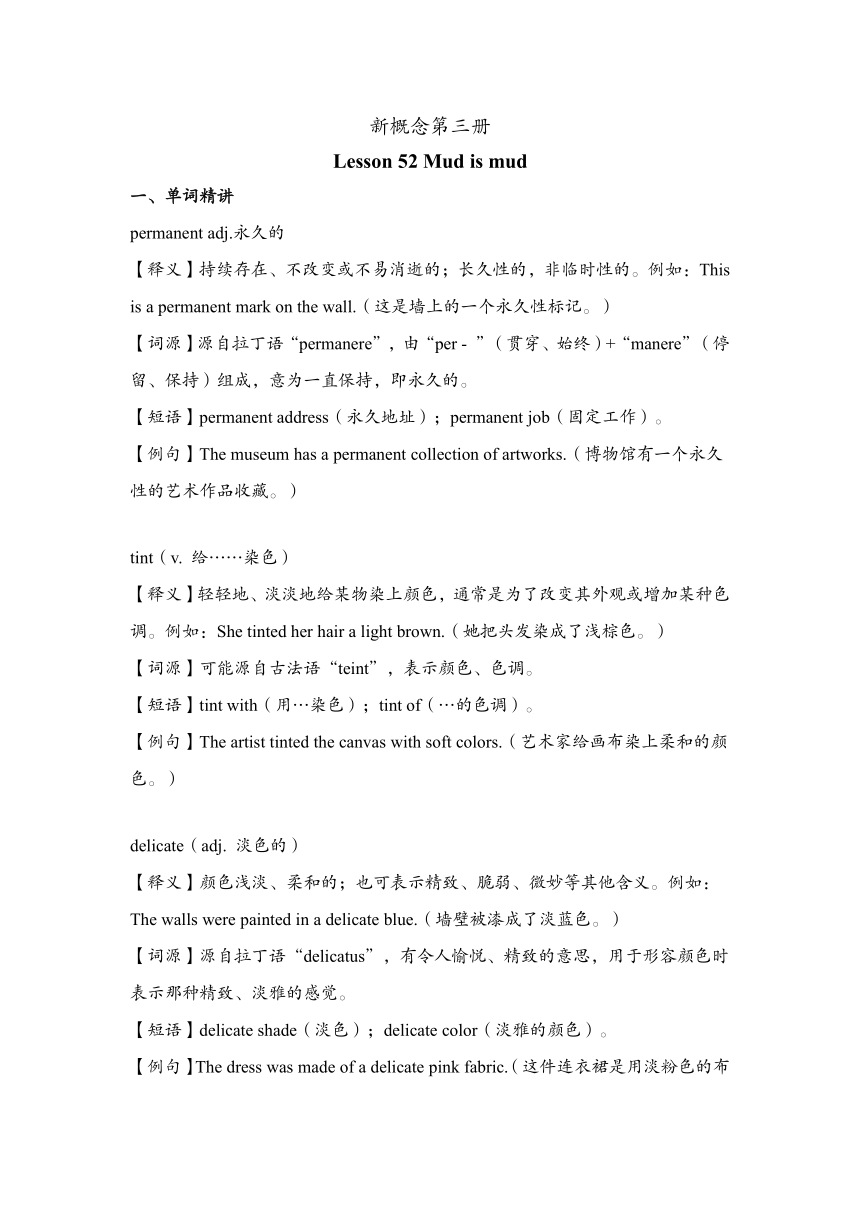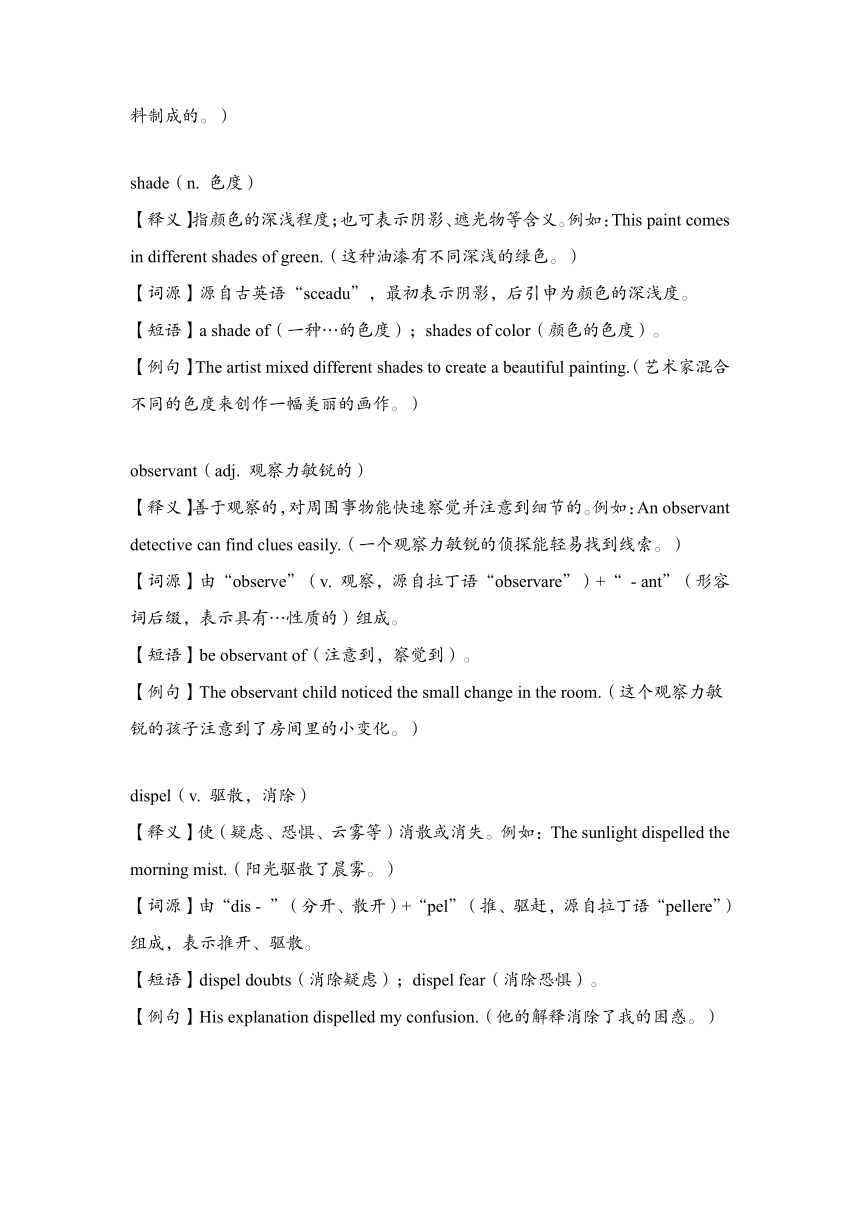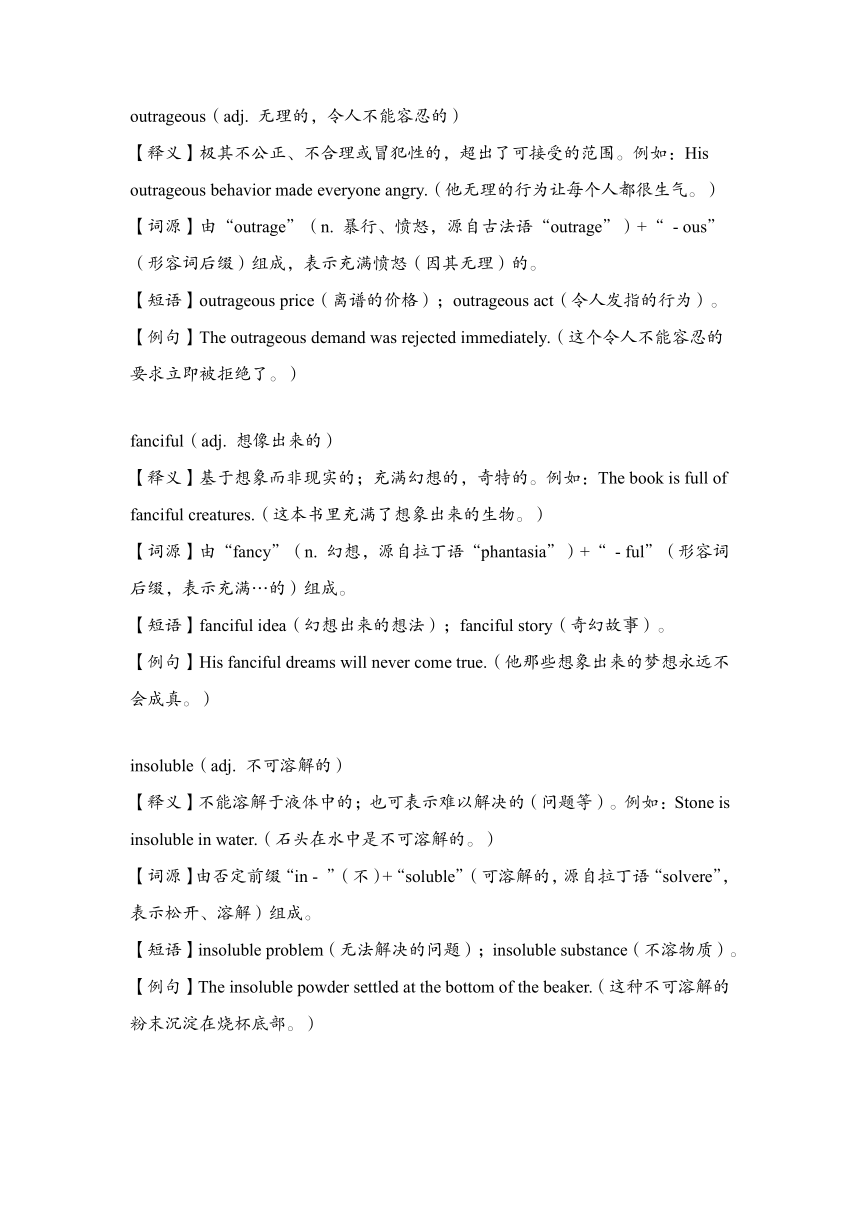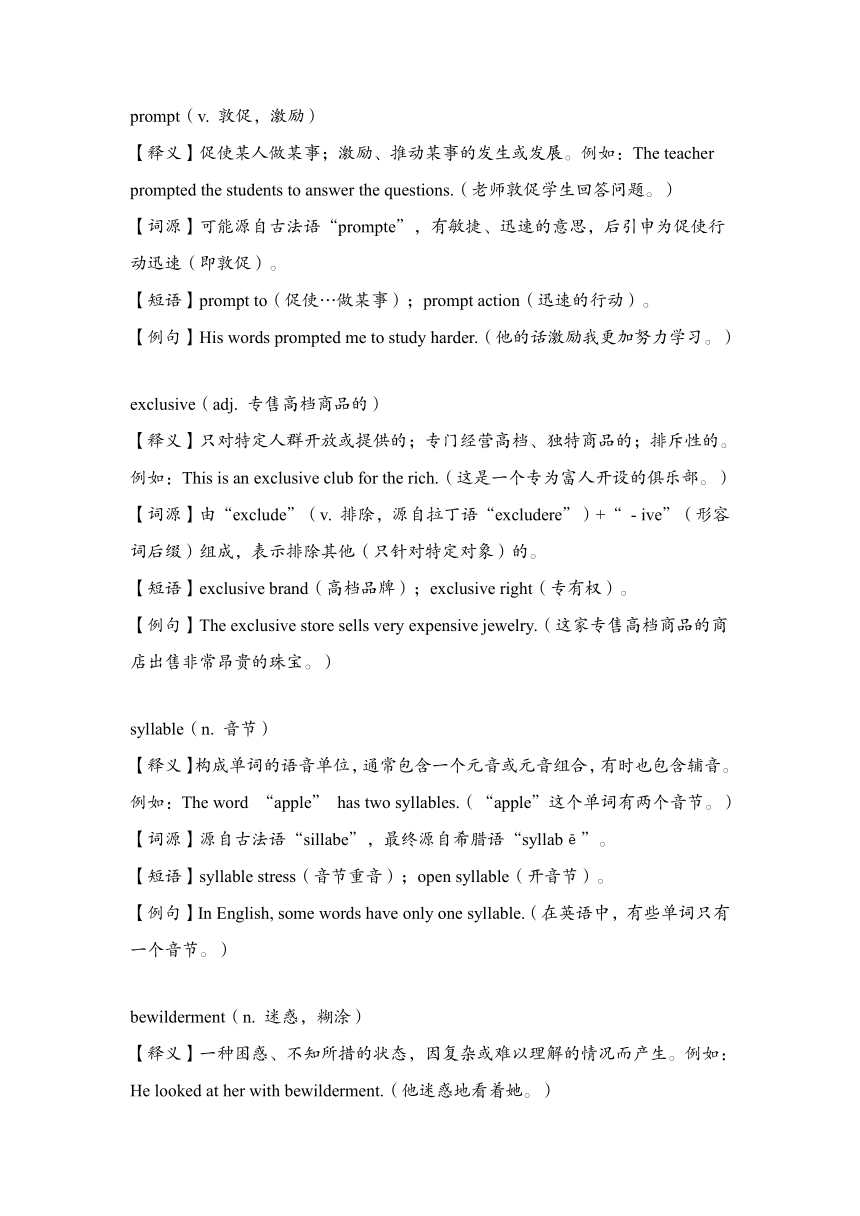新概念第三册 Lesson 52 Mud is mud 讲义
文档属性
| 名称 | 新概念第三册 Lesson 52 Mud is mud 讲义 |

|
|
| 格式 | docx | ||
| 文件大小 | 400.9KB | ||
| 资源类型 | 教案 | ||
| 版本资源 | 新概念英语 | ||
| 科目 | 英语 | ||
| 更新时间 | 2024-12-05 12:35:36 | ||
图片预览





文档简介
新概念第三册
Lesson 52 Mud is mud
单词精讲
permanent adj.永久的
【释义】持续存在、不改变或不易消逝的;长久性的,非临时性的。例如:This is a permanent mark on the wall.(这是墙上的一个永久性标记。)
【词源】源自拉丁语“permanere”,由“per - ”(贯穿、始终)+“manere”(停留、保持)组成,意为一直保持,即永久的。
【短语】permanent address(永久地址);permanent job(固定工作)。
【例句】The museum has a permanent collection of artworks.(博物馆有一个永久性的艺术作品收藏。)
tint(v. 给……染色)
【释义】轻轻地、淡淡地给某物染上颜色,通常是为了改变其外观或增加某种色调。例如:She tinted her hair a light brown.(她把头发染成了浅棕色。)
【词源】可能源自古法语“teint”,表示颜色、色调。
【短语】tint with(用…染色);tint of(…的色调)。
【例句】The artist tinted the canvas with soft colors.(艺术家给画布染上柔和的颜色。)
delicate(adj. 淡色的)
【释义】颜色浅淡、柔和的;也可表示精致、脆弱、微妙等其他含义。例如:The walls were painted in a delicate blue.(墙壁被漆成了淡蓝色。)
【词源】源自拉丁语“delicatus”,有令人愉悦、精致的意思,用于形容颜色时表示那种精致、淡雅的感觉。
【短语】delicate shade(淡色);delicate color(淡雅的颜色)。
【例句】The dress was made of a delicate pink fabric.(这件连衣裙是用淡粉色的布料制成的。)
shade(n. 色度)
【释义】指颜色的深浅程度;也可表示阴影、遮光物等含义。例如:This paint comes in different shades of green.(这种油漆有不同深浅的绿色。)
【词源】源自古英语“sceadu”,最初表示阴影,后引申为颜色的深浅度。
【短语】a shade of(一种…的色度);shades of color(颜色的色度)。
【例句】The artist mixed different shades to create a beautiful painting.(艺术家混合不同的色度来创作一幅美丽的画作。)
observant(adj. 观察力敏锐的)
【释义】善于观察的,对周围事物能快速察觉并注意到细节的。例如:An observant detective can find clues easily.(一个观察力敏锐的侦探能轻易找到线索。)
【词源】由“observe”(v. 观察,源自拉丁语“observare”)+“ - ant”(形容词后缀,表示具有…性质的)组成。
【短语】be observant of(注意到,察觉到)。
【例句】The observant child noticed the small change in the room.(这个观察力敏锐的孩子注意到了房间里的小变化。)
dispel(v. 驱散,消除)
【释义】使(疑虑、恐惧、云雾等)消散或消失。例如:The sunlight dispelled the morning mist.(阳光驱散了晨雾。)
【词源】由“dis - ”(分开、散开)+“pel”(推、驱赶,源自拉丁语“pellere”)组成,表示推开、驱散。
【短语】dispel doubts(消除疑虑);dispel fear(消除恐惧)。
【例句】His explanation dispelled my confusion.(他的解释消除了我的困惑。)
outlandish(adj. 稀奇古怪的)
【释义】看起来或听起来非常奇特、怪异,与通常的或熟悉的事物大不相同。例如:He wore an outlandish costume to the party.(他穿着一套稀奇古怪的服装去参加聚会。)
【词源】由“out - ”(外面的)+“land”(土地)+“ - ish”(形容词后缀)组成,原意为来自外地(看起来奇怪),后引申为稀奇古怪的。
【短语】outlandish behavior(古怪的行为);outlandish idea(离奇的想法)。
【例句】The outlandish building attracted a lot of attention.(那座稀奇古怪的建筑吸引了很多注意力。)
acquisition(n. 获得)
【释义】得到、获取某物(如知识、财产、技能等)的行为或过程;所获得的东西。例如:The acquisition of new skills is important for career development.(新技能的获得对职业发展很重要。)
【词源】由“acquire”(v. 获得,源自拉丁语“acquirere”)+“ - ition”(名词后缀,表示行为或结果)组成。
【短语】merger and acquisition(并购);acquisition cost(购置成本)。
【例句】The company's recent acquisition of a new technology gave it a competitive edge.(公司最近获得的一项新技术使其具有竞争优势。)
cosmetic(n. 化妆品)
【释义】用于改善或美化外貌(如皮肤、头发、指甲等)的物质,如面霜、口红、眼影等。例如:She has a lot of cosmetics in her makeup bag.(她的化妆包里有很多化妆品。)
【词源】源自希腊语“kosmētikos”,与装饰、美化有关。
【短语】cosmetic industry(化妆品行业);cosmetic product(化妆品)。
【例句】Cosmetics can enhance a person's appearance.(化妆品可以提升一个人的外貌。)
outrageous(adj. 无理的,令人不能容忍的)
【释义】极其不公正、不合理或冒犯性的,超出了可接受的范围。例如:His outrageous behavior made everyone angry.(他无理的行为让每个人都很生气。)
【词源】由“outrage”(n. 暴行、愤怒,源自古法语“outrage”)+“ - ous”(形容词后缀)组成,表示充满愤怒(因其无理)的。
【短语】outrageous price(离谱的价格);outrageous act(令人发指的行为)。
【例句】The outrageous demand was rejected immediately.(这个令人不能容忍的要求立即被拒绝了。)
fanciful(adj. 想像出来的)
【释义】基于想象而非现实的;充满幻想的,奇特的。例如:The book is full of fanciful creatures.(这本书里充满了想象出来的生物。)
【词源】由“fancy”(n. 幻想,源自拉丁语“phantasia”)+“ - ful”(形容词后缀,表示充满…的)组成。
【短语】fanciful idea(幻想出来的想法);fanciful story(奇幻故事)。
【例句】His fanciful dreams will never come true.(他那些想象出来的梦想永远不会成真。)
insoluble(adj. 不可溶解的)
【释义】不能溶解于液体中的;也可表示难以解决的(问题等)。例如:Stone is insoluble in water.(石头在水中是不可溶解的。)
【词源】由否定前缀“in - ”(不)+“soluble”(可溶解的,源自拉丁语“solvere”,表示松开、溶解)组成。
【短语】insoluble problem(无法解决的问题);insoluble substance(不溶物质)。
【例句】The insoluble powder settled at the bottom of the beaker.(这种不可溶解的粉末沉淀在烧杯底部。)
prompt(v. 敦促,激励)
【释义】促使某人做某事;激励、推动某事的发生或发展。例如:The teacher prompted the students to answer the questions.(老师敦促学生回答问题。)
【词源】可能源自古法语“prompte”,有敏捷、迅速的意思,后引申为促使行动迅速(即敦促)。
【短语】prompt to(促使…做某事);prompt action(迅速的行动)。
【例句】His words prompted me to study harder.(他的话激励我更加努力学习。)
exclusive(adj. 专售高档商品的)
【释义】只对特定人群开放或提供的;专门经营高档、独特商品的;排斥性的。例如:This is an exclusive club for the rich.(这是一个专为富人开设的俱乐部。)
【词源】由“exclude”(v. 排除,源自拉丁语“excludere”)+“ - ive”(形容词后缀)组成,表示排除其他(只针对特定对象)的。
【短语】exclusive brand(高档品牌);exclusive right(专有权)。
【例句】The exclusive store sells very expensive jewelry.(这家专售高档商品的商店出售非常昂贵的珠宝。)
syllable(n. 音节)
【释义】构成单词的语音单位,通常包含一个元音或元音组合,有时也包含辅音。例如:The word “apple” has two syllables.(“apple”这个单词有两个音节。)
【词源】源自古法语“sillabe”,最终源自希腊语“syllabē”。
【短语】syllable stress(音节重音);open syllable(开音节)。
【例句】In English, some words have only one syllable.(在英语中,有些单词只有一个音节。)
bewilderment(n. 迷惑,糊涂)
【释义】一种困惑、不知所措的状态,因复杂或难以理解的情况而产生。例如:He looked at her with bewilderment.(他迷惑地看着她。)
【词源】由“bewilder”(v. 使迷惑,由“be - ”(使…)+“wilder”(使迷失方向,源自古英语“wild”,野生的、未驯服的)组成)+“ - ment”(名词后缀,表示状态)构成。
【短语】in bewilderment(困惑地);a sense of bewilderment(一种迷惑感)。
【例句】Her sudden change of attitude left him in bewilderment.(她突然改变态度让他感到迷惑。)
freckle(n. 雀斑)
【释义】皮肤上的小斑点,通常为褐色,多因遗传或阳光照射而形成。例如:She has a few freckles on her nose.(她的鼻子上有一些雀斑。)
【词源】可能源自古英语“frecce”,与斑点有关。
【短语】a cluster of freckles(一群雀斑)。
【例句】The little girl's freckles made her look cute.(这个小女孩的雀斑让她看起来很可爱。)
evidently(adv. 显然的,明显地)
【释义】用于表示某事是容易被看到、理解或察觉到的。例如:Evidently, he didn't understand the question.(显然,他没有理解这个问题。)
【词源】由“evident”(adj. 明显的,源自拉丁语“evidens”,由“e - ”(出)+“videns”(看)组成,即能看出来的)+“ - ly”(副词后缀)组成。
【短语】evidently so(显然如此)。
【例句】He was evidently tired after a long day's work.(一整天的工作后,他显然很累了。)
weird(adj. 奇异的,古怪的)
【释义】非常奇特、不寻常或超自然的,令人感到奇怪或不安。例如:The old house had a weird atmosphere.(这所老房子有一种奇异的氛围。)
【词源】源自古英语“wyrd”,最初表示命运,后引申为奇异的(因命运的不可捉摸)。
【短语】weird behavior(古怪的行为);weird sound(怪异的声音)。
【例句】The story he told was really weird.(他讲的故事真的很古怪。)
concoction(n. 调制品)
【释义】通过混合不同的成分或元素制成的东西,如饮料、药物或特殊的混合物。例如:She made a strange concoction in the kitchen.(她在厨房制作了一种奇怪的调制品。)
【词源】由“concoct”(v. 调制、编造,由“con - ”(一起)+“coct”(煮、制作,源自拉丁语“coquere”)组成)+“ - ion”(名词后缀,表示行为或结果)构成。
【短语】a mysterious concoction(一种神秘的调制品);chemical concoction(化学调制品)。
【例句】The bartender's new concoction was very popular.(酒保的新调制品非常受欢迎。)
intoxicate(v. 陶醉,得意忘形)
【释义】使某人极度兴奋、陶醉,失去正常的判断力;也可表示使(某人)喝醉(酒等)。例如:The beautiful music intoxicated the audience.(美妙的音乐使观众陶醉。)
【词源】源自拉丁语“intoxicare”,由“in - ”(进入)+“toxicum”(毒药)组成,原意为使中毒(后引申为陶醉)。
【短语】be intoxicated with(陶醉于)。
【例句】He was intoxicated with his success.(他陶醉于自己的成功。)
blank(adj. 无表情的,茫然的)
【释义】脸上没有表情的,显示不出任何情绪或思想的;也可表示空白的(如纸张等)。例如:He had a blank look on his face.(他脸上毫无表情。)
【词源】源自古法语“blanc”,表示白色的,后引申为空白的、无表情的(像白纸一样没有内容)。
【短语】blank expression(无表情);blank stare(茫然的凝视)。
【例句】She stared at him with a blank face.(她茫然地盯着他。)
discreetly(adv. 谨慎地)
【释义】以小心、谨慎、不引人注意的方式做某事。例如:He discreetly left the room.(他谨慎地离开了房间。)
【词源】由“discreet”(adj. 谨慎的,源自拉丁语“discretus”)+“ - ly”(副词后缀)组成。
【短语】act discreetly(谨慎行事)。
【例句】The detective discreetly followed the suspect.(侦探谨慎地跟踪嫌疑犯。)
clutch(v. 抓住)
【释义】紧紧抓住(某物或某人),尤指在紧急、害怕或需要支撑的情况下。例如:She clutched her purse tightly.(她紧紧抓住她的钱包。)
【词源】可能源自古英语“clyccan”,有握紧、抱住的意思。
【短语】clutch at(试图抓住);clutch onto(紧紧抓住)。
【例句】The drowning man clutched at the rope.(溺水的人试图抓住绳子。)
adorn(v. 装饰,打扮)
【释义】使(某物或某人)变得更漂亮或更有吸引力,通过添加装饰品等方式。例如:They adorned the Christmas tree with lights and ornaments.(他们用灯和装饰品装饰圣诞树。)
【词源】源自拉丁语“adornare”,由“ad - ”(到、向)+“ornare”(装饰,源自“ornus”,一种树,其木材可用于装饰)组成。
【短语】adorn with(用…装饰);adorn oneself(打扮自己)。
【例句】She adorned her hair with a beautiful flower.(她用一朵美丽的花装饰她的头发。)
二、课文精讲
1.My cousin, Harry, keeps a large curiously-shaped bottle on permanent display in his study.
我的堂兄哈里在他的书房里一直摆着一只形状古怪的大瓶子。
Harry是my cousin的同位语,起解释说明的作用。
study作动词的意思是“学习”,此处为名词,意思是“书房”。
2.Despite the fact that the bottle is tinted a delicate shade of green, an observant visitor would soon notice that it is filled with what looks like a thick, grayish substance.尽管那只瓶子呈淡绿色,但细心的客人很快就会发现瓶里装的是一种看上去黏稠,颜色发灰的东西。
fact后面的that引导同位语从句;notice后面的that引导宾语从句。
3.If you were to ask Harry what was in the bottle, he would tell you that it contained perfumed mud.要是你问哈里瓶里装着什么,他会告诉你是香水泥。
if引导虚拟语气的句子,交代非真实条件下所得到的回答。
4.If you expressed doubt or surprise, he would immediately invite you to smell it and then to rub some into your skin.如果你表示怀疑或惊奇,他会立即请你闻一闻,然后取出一些抹在你的皮肤上。
if引导虚拟语气的句子。
rub sth.into one's skin的意思是“把某物抹在某人的皮肤上。”
5.This brief experiment would dispel any further doubts you might have.这一简单的试验会消除你可能存有的一切疑虑。
dispel doubt的意思是“消除疑虑。”
6.How Harry came into the possession of this outlandish stuff makes an interesting story which he is fond of relating.哈里如何得到这种稀奇古怪的东西的,这里有个有趣的故事,而且他挺爱把它讲给别人听。
how Harry came into the possession of this outlandish stuff是主语从句;which he is fond of relating是定语从句。
7.Furthermore, the acquisition of this bottle cured him of a bad habit he had been developing for years.此外,得到这瓶香水泥还治好了他多年的一个坏习惯。
cure sb.of的意思是“治好某人的(…病)”。但在本句中,为了更加符合汉语的表达习惯,也可以将其译为“改掉了某人的一个坏习惯。”
8.Harry used to consider it a great joke to go into expensive cosmetic shops and make outrageous requests for goods that do not exist.哈里曾认为走进一家名贵化妆品商店,荒唐地提出要买一种根本不存在的商品是件开心的事儿。
that do not exist是定语从句,说明这个goods是不存在的东西。
9.He would invent fanciful names on the spot.他会当场编造出一些稀奇古怪的货名。
on the spot的意思是“当场。”
10.On entering a shop, he would ask for a new perfume called 'Scented Shadow' or for 'insoluble bath cubes'.他走进商店后,会提出要一种名叫“香影”的新型香水或什么“不溶浴皂”。
on entering a shop为on doing结构,表示“一…就….。”
11.If a shop assistant told him she had not heard of it, he would pretend to be considerably put out.要是女售货员告诉他从未听说过这些东西,他会装出十分遗憾和不安的样子。
if引导虚拟语气的句子。
12.He loved to be told that one of his imaginary products was temporarily out of stock and he would faithfully promise to call again at some future date, but of course he never did.他爱听售货员说他想像出来的那种东西暂时脱销,于是他就煞有介事地许诺改天再来光顾。当然,他再也不会来了。
out of stock相当于lack of,意思是“脱销的。”
13.How Harry managed to keep a straight face during these performances is quite beyond me. 我实在想像不出哈里在这些表演中是怎样装出一本正经的样子的。
is quite beyond me的意思是“让我不明白。”
14.Harry does not need to be prompted to explain how he bought his precious bottle of mud.毋须暗示哈里就会向你讲起他买下那瓶珍贵香水泥的经过。
how引导宾语从句,交代explain的内容。
15.One day, he went to an exclusive shop in London and asked for 'Myrolite'.一天,他去伦敦一家高级商店要买一种叫“密诺莱特”的东西。
exclusive shop的意思是“专营店,经营高档商品的商店。”
16.The shop assistant looked puzzled and Harry repeated the word, slowly stressing each syllable.店员露出诧异的神色。哈里又慢慢地,一字一顿说了一遍这个词。
look puzzled比surprise的吃惊程度要深的多。
17.When the woman shook her head in bewilderment, Harry went on to explain that 'myrolite' was a hard, amber-like substance which could be used to remove freckles.那个女售货员还是迷惑不解地摇了摇头。哈里便进一步解释“密诺莱特”是一种质地坚硬、状似琥珀的东西,可以用来除去雀斑。
in bewilderment的意思是“迷惑不解地,”作方式状语。
18.This explanation evidently conveyed something to the woman who searched shelf after shelf.他的解释显然对女售货员有些启示。她一个货架接着一个货架地寻找。
search shelf after shelf相当于search the shelves one by one.
19.She produced all sorts of weird concoctions, but none of them met with Harry's requirements.拿出各种各样稀奇古怪的化妆品,但没有一样能够符合哈里的要求。
meet with在此句中并非“见面”的意思,而是相当于match with,意思是“符合。”
20.When Harry put on his act of being mildly annoyed, the assistant promised to order some for him.哈里装出不高兴的样子时,女售货员答应为他定货。
put on one's act of的意思是“装出…的样子。”
21.He expected the assistant to look at him in blank astonishment.他原想女售货员会惊奇地望着他,不知所措。
in blank astonishment作方式状语。
22.However, it was his turn to be surprised, for the woman's eyes immediately lit up and she fetched several bottles which she placed on the counter for Harry to inspect.没料到这回该轮到他自己吃惊了。因为那女售货员听完哈里的话后,马上眼睛一亮,拿出几瓶东西放在柜台上让哈里挑选。
place on的意思是“放在…上”。
Lesson 52 Mud is mud
单词精讲
permanent adj.永久的
【释义】持续存在、不改变或不易消逝的;长久性的,非临时性的。例如:This is a permanent mark on the wall.(这是墙上的一个永久性标记。)
【词源】源自拉丁语“permanere”,由“per - ”(贯穿、始终)+“manere”(停留、保持)组成,意为一直保持,即永久的。
【短语】permanent address(永久地址);permanent job(固定工作)。
【例句】The museum has a permanent collection of artworks.(博物馆有一个永久性的艺术作品收藏。)
tint(v. 给……染色)
【释义】轻轻地、淡淡地给某物染上颜色,通常是为了改变其外观或增加某种色调。例如:She tinted her hair a light brown.(她把头发染成了浅棕色。)
【词源】可能源自古法语“teint”,表示颜色、色调。
【短语】tint with(用…染色);tint of(…的色调)。
【例句】The artist tinted the canvas with soft colors.(艺术家给画布染上柔和的颜色。)
delicate(adj. 淡色的)
【释义】颜色浅淡、柔和的;也可表示精致、脆弱、微妙等其他含义。例如:The walls were painted in a delicate blue.(墙壁被漆成了淡蓝色。)
【词源】源自拉丁语“delicatus”,有令人愉悦、精致的意思,用于形容颜色时表示那种精致、淡雅的感觉。
【短语】delicate shade(淡色);delicate color(淡雅的颜色)。
【例句】The dress was made of a delicate pink fabric.(这件连衣裙是用淡粉色的布料制成的。)
shade(n. 色度)
【释义】指颜色的深浅程度;也可表示阴影、遮光物等含义。例如:This paint comes in different shades of green.(这种油漆有不同深浅的绿色。)
【词源】源自古英语“sceadu”,最初表示阴影,后引申为颜色的深浅度。
【短语】a shade of(一种…的色度);shades of color(颜色的色度)。
【例句】The artist mixed different shades to create a beautiful painting.(艺术家混合不同的色度来创作一幅美丽的画作。)
observant(adj. 观察力敏锐的)
【释义】善于观察的,对周围事物能快速察觉并注意到细节的。例如:An observant detective can find clues easily.(一个观察力敏锐的侦探能轻易找到线索。)
【词源】由“observe”(v. 观察,源自拉丁语“observare”)+“ - ant”(形容词后缀,表示具有…性质的)组成。
【短语】be observant of(注意到,察觉到)。
【例句】The observant child noticed the small change in the room.(这个观察力敏锐的孩子注意到了房间里的小变化。)
dispel(v. 驱散,消除)
【释义】使(疑虑、恐惧、云雾等)消散或消失。例如:The sunlight dispelled the morning mist.(阳光驱散了晨雾。)
【词源】由“dis - ”(分开、散开)+“pel”(推、驱赶,源自拉丁语“pellere”)组成,表示推开、驱散。
【短语】dispel doubts(消除疑虑);dispel fear(消除恐惧)。
【例句】His explanation dispelled my confusion.(他的解释消除了我的困惑。)
outlandish(adj. 稀奇古怪的)
【释义】看起来或听起来非常奇特、怪异,与通常的或熟悉的事物大不相同。例如:He wore an outlandish costume to the party.(他穿着一套稀奇古怪的服装去参加聚会。)
【词源】由“out - ”(外面的)+“land”(土地)+“ - ish”(形容词后缀)组成,原意为来自外地(看起来奇怪),后引申为稀奇古怪的。
【短语】outlandish behavior(古怪的行为);outlandish idea(离奇的想法)。
【例句】The outlandish building attracted a lot of attention.(那座稀奇古怪的建筑吸引了很多注意力。)
acquisition(n. 获得)
【释义】得到、获取某物(如知识、财产、技能等)的行为或过程;所获得的东西。例如:The acquisition of new skills is important for career development.(新技能的获得对职业发展很重要。)
【词源】由“acquire”(v. 获得,源自拉丁语“acquirere”)+“ - ition”(名词后缀,表示行为或结果)组成。
【短语】merger and acquisition(并购);acquisition cost(购置成本)。
【例句】The company's recent acquisition of a new technology gave it a competitive edge.(公司最近获得的一项新技术使其具有竞争优势。)
cosmetic(n. 化妆品)
【释义】用于改善或美化外貌(如皮肤、头发、指甲等)的物质,如面霜、口红、眼影等。例如:She has a lot of cosmetics in her makeup bag.(她的化妆包里有很多化妆品。)
【词源】源自希腊语“kosmētikos”,与装饰、美化有关。
【短语】cosmetic industry(化妆品行业);cosmetic product(化妆品)。
【例句】Cosmetics can enhance a person's appearance.(化妆品可以提升一个人的外貌。)
outrageous(adj. 无理的,令人不能容忍的)
【释义】极其不公正、不合理或冒犯性的,超出了可接受的范围。例如:His outrageous behavior made everyone angry.(他无理的行为让每个人都很生气。)
【词源】由“outrage”(n. 暴行、愤怒,源自古法语“outrage”)+“ - ous”(形容词后缀)组成,表示充满愤怒(因其无理)的。
【短语】outrageous price(离谱的价格);outrageous act(令人发指的行为)。
【例句】The outrageous demand was rejected immediately.(这个令人不能容忍的要求立即被拒绝了。)
fanciful(adj. 想像出来的)
【释义】基于想象而非现实的;充满幻想的,奇特的。例如:The book is full of fanciful creatures.(这本书里充满了想象出来的生物。)
【词源】由“fancy”(n. 幻想,源自拉丁语“phantasia”)+“ - ful”(形容词后缀,表示充满…的)组成。
【短语】fanciful idea(幻想出来的想法);fanciful story(奇幻故事)。
【例句】His fanciful dreams will never come true.(他那些想象出来的梦想永远不会成真。)
insoluble(adj. 不可溶解的)
【释义】不能溶解于液体中的;也可表示难以解决的(问题等)。例如:Stone is insoluble in water.(石头在水中是不可溶解的。)
【词源】由否定前缀“in - ”(不)+“soluble”(可溶解的,源自拉丁语“solvere”,表示松开、溶解)组成。
【短语】insoluble problem(无法解决的问题);insoluble substance(不溶物质)。
【例句】The insoluble powder settled at the bottom of the beaker.(这种不可溶解的粉末沉淀在烧杯底部。)
prompt(v. 敦促,激励)
【释义】促使某人做某事;激励、推动某事的发生或发展。例如:The teacher prompted the students to answer the questions.(老师敦促学生回答问题。)
【词源】可能源自古法语“prompte”,有敏捷、迅速的意思,后引申为促使行动迅速(即敦促)。
【短语】prompt to(促使…做某事);prompt action(迅速的行动)。
【例句】His words prompted me to study harder.(他的话激励我更加努力学习。)
exclusive(adj. 专售高档商品的)
【释义】只对特定人群开放或提供的;专门经营高档、独特商品的;排斥性的。例如:This is an exclusive club for the rich.(这是一个专为富人开设的俱乐部。)
【词源】由“exclude”(v. 排除,源自拉丁语“excludere”)+“ - ive”(形容词后缀)组成,表示排除其他(只针对特定对象)的。
【短语】exclusive brand(高档品牌);exclusive right(专有权)。
【例句】The exclusive store sells very expensive jewelry.(这家专售高档商品的商店出售非常昂贵的珠宝。)
syllable(n. 音节)
【释义】构成单词的语音单位,通常包含一个元音或元音组合,有时也包含辅音。例如:The word “apple” has two syllables.(“apple”这个单词有两个音节。)
【词源】源自古法语“sillabe”,最终源自希腊语“syllabē”。
【短语】syllable stress(音节重音);open syllable(开音节)。
【例句】In English, some words have only one syllable.(在英语中,有些单词只有一个音节。)
bewilderment(n. 迷惑,糊涂)
【释义】一种困惑、不知所措的状态,因复杂或难以理解的情况而产生。例如:He looked at her with bewilderment.(他迷惑地看着她。)
【词源】由“bewilder”(v. 使迷惑,由“be - ”(使…)+“wilder”(使迷失方向,源自古英语“wild”,野生的、未驯服的)组成)+“ - ment”(名词后缀,表示状态)构成。
【短语】in bewilderment(困惑地);a sense of bewilderment(一种迷惑感)。
【例句】Her sudden change of attitude left him in bewilderment.(她突然改变态度让他感到迷惑。)
freckle(n. 雀斑)
【释义】皮肤上的小斑点,通常为褐色,多因遗传或阳光照射而形成。例如:She has a few freckles on her nose.(她的鼻子上有一些雀斑。)
【词源】可能源自古英语“frecce”,与斑点有关。
【短语】a cluster of freckles(一群雀斑)。
【例句】The little girl's freckles made her look cute.(这个小女孩的雀斑让她看起来很可爱。)
evidently(adv. 显然的,明显地)
【释义】用于表示某事是容易被看到、理解或察觉到的。例如:Evidently, he didn't understand the question.(显然,他没有理解这个问题。)
【词源】由“evident”(adj. 明显的,源自拉丁语“evidens”,由“e - ”(出)+“videns”(看)组成,即能看出来的)+“ - ly”(副词后缀)组成。
【短语】evidently so(显然如此)。
【例句】He was evidently tired after a long day's work.(一整天的工作后,他显然很累了。)
weird(adj. 奇异的,古怪的)
【释义】非常奇特、不寻常或超自然的,令人感到奇怪或不安。例如:The old house had a weird atmosphere.(这所老房子有一种奇异的氛围。)
【词源】源自古英语“wyrd”,最初表示命运,后引申为奇异的(因命运的不可捉摸)。
【短语】weird behavior(古怪的行为);weird sound(怪异的声音)。
【例句】The story he told was really weird.(他讲的故事真的很古怪。)
concoction(n. 调制品)
【释义】通过混合不同的成分或元素制成的东西,如饮料、药物或特殊的混合物。例如:She made a strange concoction in the kitchen.(她在厨房制作了一种奇怪的调制品。)
【词源】由“concoct”(v. 调制、编造,由“con - ”(一起)+“coct”(煮、制作,源自拉丁语“coquere”)组成)+“ - ion”(名词后缀,表示行为或结果)构成。
【短语】a mysterious concoction(一种神秘的调制品);chemical concoction(化学调制品)。
【例句】The bartender's new concoction was very popular.(酒保的新调制品非常受欢迎。)
intoxicate(v. 陶醉,得意忘形)
【释义】使某人极度兴奋、陶醉,失去正常的判断力;也可表示使(某人)喝醉(酒等)。例如:The beautiful music intoxicated the audience.(美妙的音乐使观众陶醉。)
【词源】源自拉丁语“intoxicare”,由“in - ”(进入)+“toxicum”(毒药)组成,原意为使中毒(后引申为陶醉)。
【短语】be intoxicated with(陶醉于)。
【例句】He was intoxicated with his success.(他陶醉于自己的成功。)
blank(adj. 无表情的,茫然的)
【释义】脸上没有表情的,显示不出任何情绪或思想的;也可表示空白的(如纸张等)。例如:He had a blank look on his face.(他脸上毫无表情。)
【词源】源自古法语“blanc”,表示白色的,后引申为空白的、无表情的(像白纸一样没有内容)。
【短语】blank expression(无表情);blank stare(茫然的凝视)。
【例句】She stared at him with a blank face.(她茫然地盯着他。)
discreetly(adv. 谨慎地)
【释义】以小心、谨慎、不引人注意的方式做某事。例如:He discreetly left the room.(他谨慎地离开了房间。)
【词源】由“discreet”(adj. 谨慎的,源自拉丁语“discretus”)+“ - ly”(副词后缀)组成。
【短语】act discreetly(谨慎行事)。
【例句】The detective discreetly followed the suspect.(侦探谨慎地跟踪嫌疑犯。)
clutch(v. 抓住)
【释义】紧紧抓住(某物或某人),尤指在紧急、害怕或需要支撑的情况下。例如:She clutched her purse tightly.(她紧紧抓住她的钱包。)
【词源】可能源自古英语“clyccan”,有握紧、抱住的意思。
【短语】clutch at(试图抓住);clutch onto(紧紧抓住)。
【例句】The drowning man clutched at the rope.(溺水的人试图抓住绳子。)
adorn(v. 装饰,打扮)
【释义】使(某物或某人)变得更漂亮或更有吸引力,通过添加装饰品等方式。例如:They adorned the Christmas tree with lights and ornaments.(他们用灯和装饰品装饰圣诞树。)
【词源】源自拉丁语“adornare”,由“ad - ”(到、向)+“ornare”(装饰,源自“ornus”,一种树,其木材可用于装饰)组成。
【短语】adorn with(用…装饰);adorn oneself(打扮自己)。
【例句】She adorned her hair with a beautiful flower.(她用一朵美丽的花装饰她的头发。)
二、课文精讲
1.My cousin, Harry, keeps a large curiously-shaped bottle on permanent display in his study.
我的堂兄哈里在他的书房里一直摆着一只形状古怪的大瓶子。
Harry是my cousin的同位语,起解释说明的作用。
study作动词的意思是“学习”,此处为名词,意思是“书房”。
2.Despite the fact that the bottle is tinted a delicate shade of green, an observant visitor would soon notice that it is filled with what looks like a thick, grayish substance.尽管那只瓶子呈淡绿色,但细心的客人很快就会发现瓶里装的是一种看上去黏稠,颜色发灰的东西。
fact后面的that引导同位语从句;notice后面的that引导宾语从句。
3.If you were to ask Harry what was in the bottle, he would tell you that it contained perfumed mud.要是你问哈里瓶里装着什么,他会告诉你是香水泥。
if引导虚拟语气的句子,交代非真实条件下所得到的回答。
4.If you expressed doubt or surprise, he would immediately invite you to smell it and then to rub some into your skin.如果你表示怀疑或惊奇,他会立即请你闻一闻,然后取出一些抹在你的皮肤上。
if引导虚拟语气的句子。
rub sth.into one's skin的意思是“把某物抹在某人的皮肤上。”
5.This brief experiment would dispel any further doubts you might have.这一简单的试验会消除你可能存有的一切疑虑。
dispel doubt的意思是“消除疑虑。”
6.How Harry came into the possession of this outlandish stuff makes an interesting story which he is fond of relating.哈里如何得到这种稀奇古怪的东西的,这里有个有趣的故事,而且他挺爱把它讲给别人听。
how Harry came into the possession of this outlandish stuff是主语从句;which he is fond of relating是定语从句。
7.Furthermore, the acquisition of this bottle cured him of a bad habit he had been developing for years.此外,得到这瓶香水泥还治好了他多年的一个坏习惯。
cure sb.of的意思是“治好某人的(…病)”。但在本句中,为了更加符合汉语的表达习惯,也可以将其译为“改掉了某人的一个坏习惯。”
8.Harry used to consider it a great joke to go into expensive cosmetic shops and make outrageous requests for goods that do not exist.哈里曾认为走进一家名贵化妆品商店,荒唐地提出要买一种根本不存在的商品是件开心的事儿。
that do not exist是定语从句,说明这个goods是不存在的东西。
9.He would invent fanciful names on the spot.他会当场编造出一些稀奇古怪的货名。
on the spot的意思是“当场。”
10.On entering a shop, he would ask for a new perfume called 'Scented Shadow' or for 'insoluble bath cubes'.他走进商店后,会提出要一种名叫“香影”的新型香水或什么“不溶浴皂”。
on entering a shop为on doing结构,表示“一…就….。”
11.If a shop assistant told him she had not heard of it, he would pretend to be considerably put out.要是女售货员告诉他从未听说过这些东西,他会装出十分遗憾和不安的样子。
if引导虚拟语气的句子。
12.He loved to be told that one of his imaginary products was temporarily out of stock and he would faithfully promise to call again at some future date, but of course he never did.他爱听售货员说他想像出来的那种东西暂时脱销,于是他就煞有介事地许诺改天再来光顾。当然,他再也不会来了。
out of stock相当于lack of,意思是“脱销的。”
13.How Harry managed to keep a straight face during these performances is quite beyond me. 我实在想像不出哈里在这些表演中是怎样装出一本正经的样子的。
is quite beyond me的意思是“让我不明白。”
14.Harry does not need to be prompted to explain how he bought his precious bottle of mud.毋须暗示哈里就会向你讲起他买下那瓶珍贵香水泥的经过。
how引导宾语从句,交代explain的内容。
15.One day, he went to an exclusive shop in London and asked for 'Myrolite'.一天,他去伦敦一家高级商店要买一种叫“密诺莱特”的东西。
exclusive shop的意思是“专营店,经营高档商品的商店。”
16.The shop assistant looked puzzled and Harry repeated the word, slowly stressing each syllable.店员露出诧异的神色。哈里又慢慢地,一字一顿说了一遍这个词。
look puzzled比surprise的吃惊程度要深的多。
17.When the woman shook her head in bewilderment, Harry went on to explain that 'myrolite' was a hard, amber-like substance which could be used to remove freckles.那个女售货员还是迷惑不解地摇了摇头。哈里便进一步解释“密诺莱特”是一种质地坚硬、状似琥珀的东西,可以用来除去雀斑。
in bewilderment的意思是“迷惑不解地,”作方式状语。
18.This explanation evidently conveyed something to the woman who searched shelf after shelf.他的解释显然对女售货员有些启示。她一个货架接着一个货架地寻找。
search shelf after shelf相当于search the shelves one by one.
19.She produced all sorts of weird concoctions, but none of them met with Harry's requirements.拿出各种各样稀奇古怪的化妆品,但没有一样能够符合哈里的要求。
meet with在此句中并非“见面”的意思,而是相当于match with,意思是“符合。”
20.When Harry put on his act of being mildly annoyed, the assistant promised to order some for him.哈里装出不高兴的样子时,女售货员答应为他定货。
put on one's act of的意思是“装出…的样子。”
21.He expected the assistant to look at him in blank astonishment.他原想女售货员会惊奇地望着他,不知所措。
in blank astonishment作方式状语。
22.However, it was his turn to be surprised, for the woman's eyes immediately lit up and she fetched several bottles which she placed on the counter for Harry to inspect.没料到这回该轮到他自己吃惊了。因为那女售货员听完哈里的话后,马上眼睛一亮,拿出几瓶东西放在柜台上让哈里挑选。
place on的意思是“放在…上”。
同课章节目录
